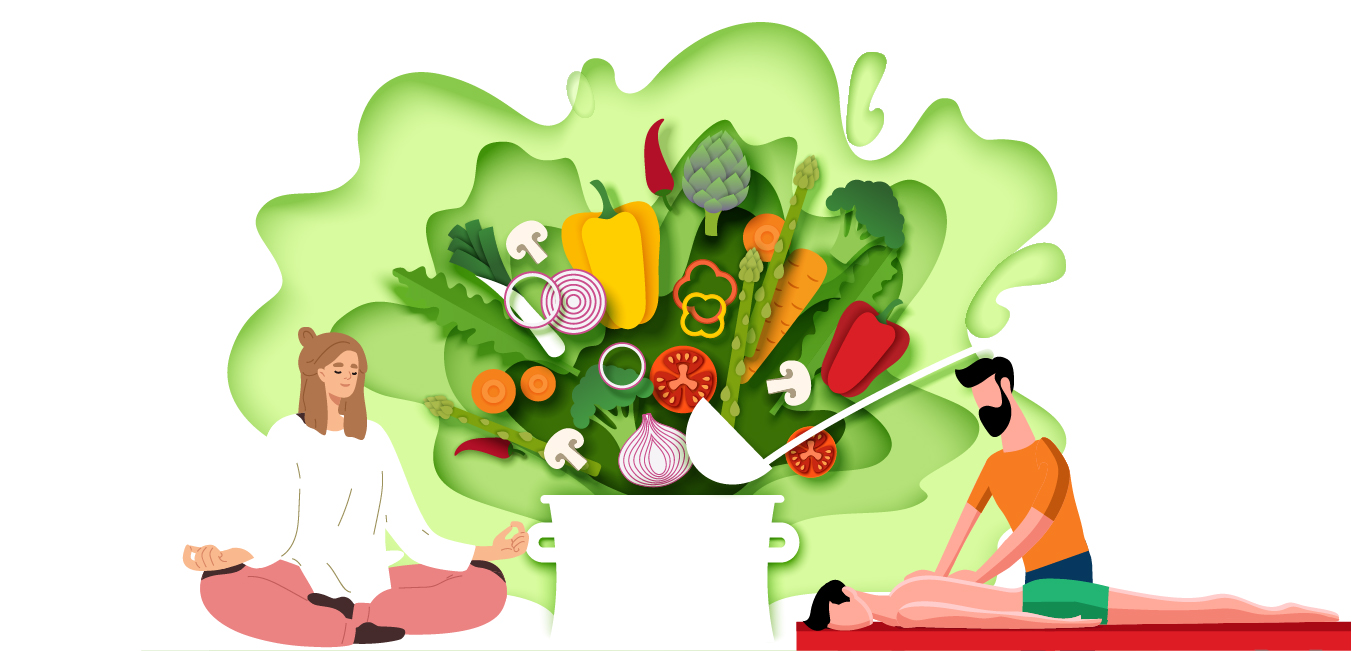
Asthma is an inflammatory health condition that affects the functioning of the lungs. The symptoms, called attacks, show up episodically.
Read more about asthma here
Naturopathy believes in building harmony with the principles of nature and makes use of the body’s innate vital energy to manage asthma. The Central Council of Research in Yoga and Naturopathy (CCRYN) states that naturopathic management aims at preventing the narrowing of the airway (bronchoconstriction) and tackling triggers.
Read more about the principles of naturopathy here
Happiest Health talked to naturopaths to understand the modalities used in naturopathy to manage asthma. Here is what they say.
Dr Narendra Shetty, chief wellness officer at Kshemavana, a wellness and naturopathy retreat centre at Bengaluru, says that when one has a health condition, the body’s innate ability to heal switches off. Naturopathic management comes in at that point to bring back the lost innate energy.
Naturopathy manages asthma in two stages, namely short-term interventions to bring down acute symptoms and long-term management to provide enough strength to fight against the condition, adds Dr Shetty.
Short-term interventions include educating the person regarding the course of the condition (pathophysiology), symptoms and triggering factors, and therapies such as hydrotherapy, massages, sunbath and dietic interventions.
Long-term interventions include yoga (pranayama techniques, chair breathing exercises), supplements and acupuncture.
Lifestyle modifications
Lifestyle plays an important role in getting better results from any management method, according to Dr Shetty. Understanding their condition allows individuals to avoid foods, habits, and triggers. It also helps them understand how to take care of themselves.
Naturopathic therapies
Dr V Venugopal, medical officer from Chennai’s Government Naturopathy and Yoga Medical College says that the therapies focus on eliminating excess phlegm. To do so, various therapies such as hydrotherapy and massages are used.
Hydrotherapy
Hydrotherapy involves using water at different temperatures in the form of cold or hot water packs, compresses, steams, showers and enemas, says Dr Venugopal.
Chest pack helps in relieving pain and congestion if performed for a minimum of seven to ten days.
Chest massage followed by fomentation (applying heat to induce sweating) widens blood vessels, (vasodilation) says Dr Venugopal.
Hot foot bath and arm bath were found to be effective in managing asthma, reports a case study by researchers from Chennai’s Government Yoga and Naturopathy College.
Asthma bath – It is a form of hydrotherapy for asthmatics that involves splashing water on the chest. This sudden splashing helps improve lung function by widening of blood vessels (vasodilation) in the respiratory tract, says Dr Shetty.
Read more about hydrotherapy here
However, there are multiple contra-indications for this procedure. People with heart ailments, open wounds and fractures; those with high or low blood pressure; individuals recently operated upon; menstruating and pregnant women; and those with vertigo are advised against undergoing the asthma bath, adds Dr Shetty.
Sunbath
Vitamin D deficiency is often linked with severe asthma. A 2010 study published in the Annals of Allergy, Asthma and Immunology has also established that vitamin D supplementation can lead to improved asthma management.
Read more about Vitamin D here
Yoga
Yoga has an important role in managing asthma as it relaxes and calms the mind and body, says Dr Shetty. He mentions that the chair breathing exercise – a special module developed by Swami Vivekananda Yoga Anusandhana Samsthana (S-VYASA) University is extremely helpful.
Dr Venugopal says that pranayama techniques such as nadi-shodhana pranayama (alternate-nostril breathing) and bhramari pranayama (exhalation with humming sound) have been found to be beneficial in asthma management.
From a meta-analysis involving 15 randomised clinical trials (RCT) with 1,048 participants, researchers concluded that there is moderate evidence of yoga being effective in improving the quality of life and symptoms in people with asthma. They also added that research involving a larger population size and better methodological and reporting quality is needed.
However, multiple studies have established that breathing exercises can significantly improve lung function. A 2016 study established the positive effect of pranayama involving a small group of 55 participants with mild to moderate asthma.
Read more about pranayama here
Diet
Current research has demonstrated that diet plays an important role in managing asthma. A 2020 meta-analysis examined the role of diet in preventing and managing asthma. The researchers concluded that an increased intake of fruits and vegetables and reduced consumption of saturated fat and dairy products can help prevent and manage asthma. Additionally, components such as antioxidants, fibres, polyunsaturated fatty acids (PUFA), and vitamin D can affect the immune pathways involved in asthma.
Dr Shetty says that introducing anti-inflammatory herbs such as ginger, spirulina, holy basil, clove, broccoli, and foods rich in vitamin A and C play an important role for asthmatics. He highlights that lycopene-rich foods such as tomatoes, watermelons, and grapefruits can also help in bringing down inflammation. In addition, Dr Venugopal recommends expectorants (that help clear mucus or phlegm from the airways) such as ginger, garlic, holy basil, and mint leaves to be included in the diet.















